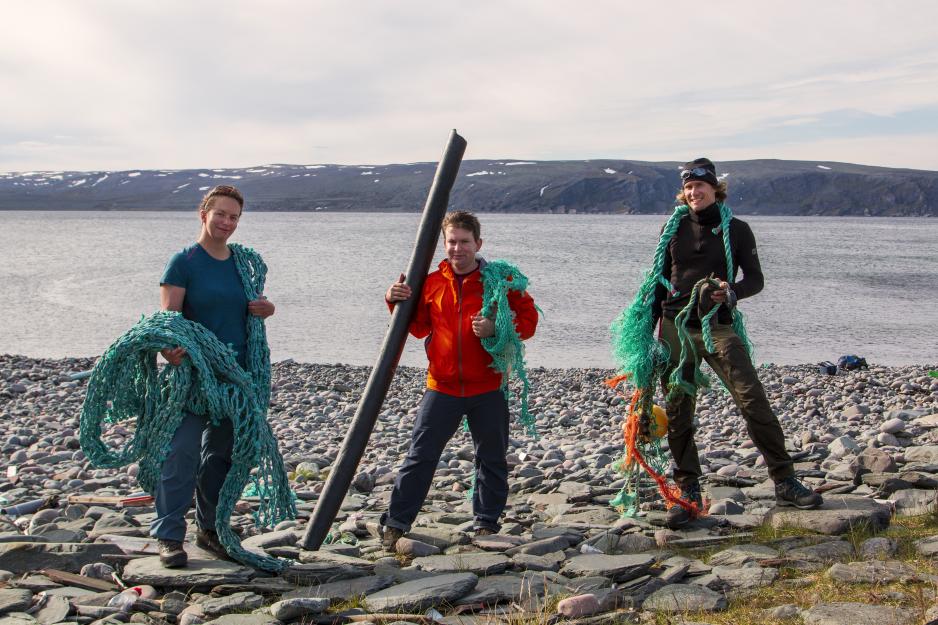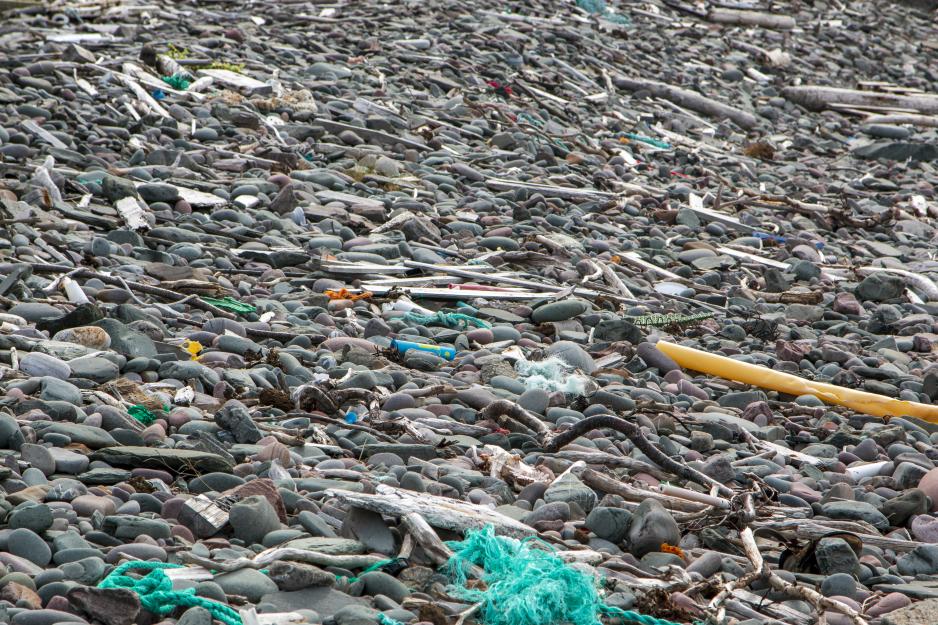Lofoten-Based Companies Receive Millions to Clean Up Marine Plastic Pollution

(From the left: Marthe Larsen haarr, Michael Pantalos and Carl Höjman from Salt, here at work along the Finnmark coast to document marine plastic pollution. Photo: Amund Trellevik
A cluster of companies based in and around Lofoten, Norway won a national competition. The Marine Recycling Center argues that it can develop a brand new industry: Making money from cleaning up marine plastic pollution.
Last Friday, it was announced that the Marine Recycling Center (MRC), a national business cluster headquartered in Lofoten, Norway has been included to the state-funded program Norwegian Innovation Clusters.
General Manager of Salt and one of the initiators of the MRC, Kjersti Eline Busch, comes right from the ceremony at Innovation Norway when HNN reaches her on the phone.
- This means recognition of what we have achieved so far and that they consider what we do viable, Busch says.

Kjersti Eine Tønnessen Busch, General Manager of Salt. Photo: Espen Mortensen
NOK 2 million every year
The Marine Recycling Center beat 16 competitors to the finish line and was one out of four new industrial clusters included in the prestigious program. Specifically, the MRC companies receive financial funding for project management and meetings, as well as close follow-up and advising.
The support amounts to NOK 2 million every year for a period of three years. The 19 membership companies of the MRC commit to putting an equal amount of their own resources into the collaboration.
- This is about realizing that one company cannot solve the challenges we face today on its own. That said, cooperation is very difficult. It is easy to say that it is important, yet managing to do so requires trust and time. Joining the cluster program enables us to do so to a much higher degree, Busch says.
- Many of the companies of this cluster have their background in oil-spill protection technology and have worked together before. Now, we give this new industry a new leg on which to stand.
We are building up a brand-new industry: Cleaning up marine plastic pollution. However, customers do not exactly line up to pay for cleaning up marine pollution.

This is what it looks like when Salt is out on field work along the coast. Marine littering is documented and carefully registered. Photo: Amund Trellevik
Ocean plastics
300 million tons of plastic waste are produced every year. That is nearly the weight of all people on the earth. Eight millions of this ends up in the world’s oceans, according to the UN Environmental Program.
Half of all plastic produced is designed to be used once, then thrown away.
Researchers estimate that a whopping 8.4 billion tons of plastic waste has been produced since the early 1950s. 60 percent of this has ended up on waste landfills or in nature. Only nine (9!) percent of all plastic the world ever made has been recycled.
Scientists worry about the development in the use of plastic: Ever since the 1950s, the increase in plastic use has been greater than that of any other material. An increasing amount of plastic produced is designed to be used only once. If this trend continues, plastic production will account for 20 percent of the world’s total oil production in 30 years.
Cigarette butts, where the filter contains small plastic fibers, is the most common source of plastic in nature.
Over the last years, several governments have taken initiatives to reduce plastic pollution. In Africa, 25 countries have a full ban on use of plastic bags.
Source: UN Environmental Program
Will develop a new industry
It all started with a meeting between SALT and Terje Olav Hansen, the then-Managing Director of Norlense, an oil-spill protection supplier, who has now founded his own company that works on cleaning up marine littering.
- This was where the idea came up: It must be possible to use oil-spill protection technology to clean up marine pollution. Hansen had the technology suppliers whereas we had the professional knowledge about marine pollution, Busch says.
Their first meeting as a business cluster took place two years ago. Today, the MRC consists of 19 member companies. Their goal is to develop a complete industry chain managing marine pollution from mapping to cleaning up and managing waste.
- We are building up a brand new industry: Cleaning the oceans of plastic. However, customers do not exactly line up to pay for cleaning up marine pollution. Who the customers will be is a question we must solve nationally and also globally, Busch says.
They nevertheless believe this market will have to come.
- We are facing an overwhelming problem with plastic littered into the world’s oceans. In many countries, lack of waste management systems allows plastic to flow into the oceans. They lack systems for collecting waste and for what to do with waste that has been collected. In order to solve such a problem, you have to solve a series of problems at the same time. It is not enough to bring in one kind of technology.
- How far away are you from the goal about developing this value chain?
- We have come a long way on the first part, which is about mapping the problem. We also have companies in our cluster who have come a long way in establishing an economy for beach cleanup in countries like Indonesia, such as Empower, and companies developing technology that can be used to gather up floating litter in the ocean, like LoVe Mar, Busch says.
As for the last part of the value chain, managing waste after it has been collected, they have not come quite as far yet, she says.
- This also represents the biggest challenge. When you gather litter in the ocean near an island, be it Indonesia or Svalbard, you will one day have to transport that waste to a more central point in order for it to be managed. In our cluster, we have a company with a promising technology: They want to burn plastic waste in order to produce energy, and then use this energy to create freshwater from saltwater. However, this is still in a testing phase.
The only cluster based in the Arctic
The cluster program of which MRC is now a member is a part of a collaboration between the Norwegian Research Council, Siva and Innovation Norway.
- In order to be accepted onto the program, the company cluster must demonstrate that it has the potential to make money by working together and that they have the right companies and actors on board, says Espen Warland, Special Advisor at Innovation Norway.
In addition, they must demonstrate that they contribute to innovation regionally as well as nationally. The Marine Recycling Center is the only one of the successful applicants int his year’s competition that is based in Northern Norway.
- Of course it matters that the Marine Recycling Center will be important for regional development in the High North, however, this is just a minor part of the assessment criteria, says Warland.
The program is funded by the Norwegian Ministry for Trade, Fish and Industry as well as the Ministry for Local Government and Modernisation.

300 million tons of plastic waste are currently produced every year. That is nearly the weight of all people on earth. Eight millions of this ends up in the world’s oceans, according to the UN Environmental Program. Here from the coast of Finnmark County in Northern Norway. Photo: Amund Trellevik
Will work for producer responsibility for plastic waste
SALT makes it own money from cleaning up marine littering today, in Norway, though this is mainly state funded. The global market is still young.
- In a longer term perspective, we must hold the producers of plastic packaging accountable and make sure they also carry an economic responsibility for cleaning up what they produce. The current main challenge is that major multinational companies make money on producing packaging which later ends up as waste in poor countries that have no systems or resources for managing this waste. Thus, we argue that it is necessary to establish a so-called “producers’ responsibility”, Busch says.
- If producers are not held responsible, then perhaps you do not have anyone who want to or have to pay for the solutions you develop?
- No, that would soon leave us with governments and environmental organizations. Though that will not be enough to solve the problem.
There are several actors working for a higher degree of producers’ responsibility for plastic producers.
- There are a few producers who are responsible for a very big share of the world’s plastic waste. Thus, many argue that this would be the most fair solution. Legislation is needed, however, much is already happening when it comes to legislation, such as the EU’s Plastic Directive.
Bush has worked with marine littering for five years and sees a rapidly increasing interest in this.
- We do believe that one will find good solutions to fund clean-up, and also to limit the problem, she says.
If they succeed, the MRC will both be part of that solution and able to make good money from it.
This article was originally published in Norwegian and has been translated by HNN's Elisabeth Bergquist.
